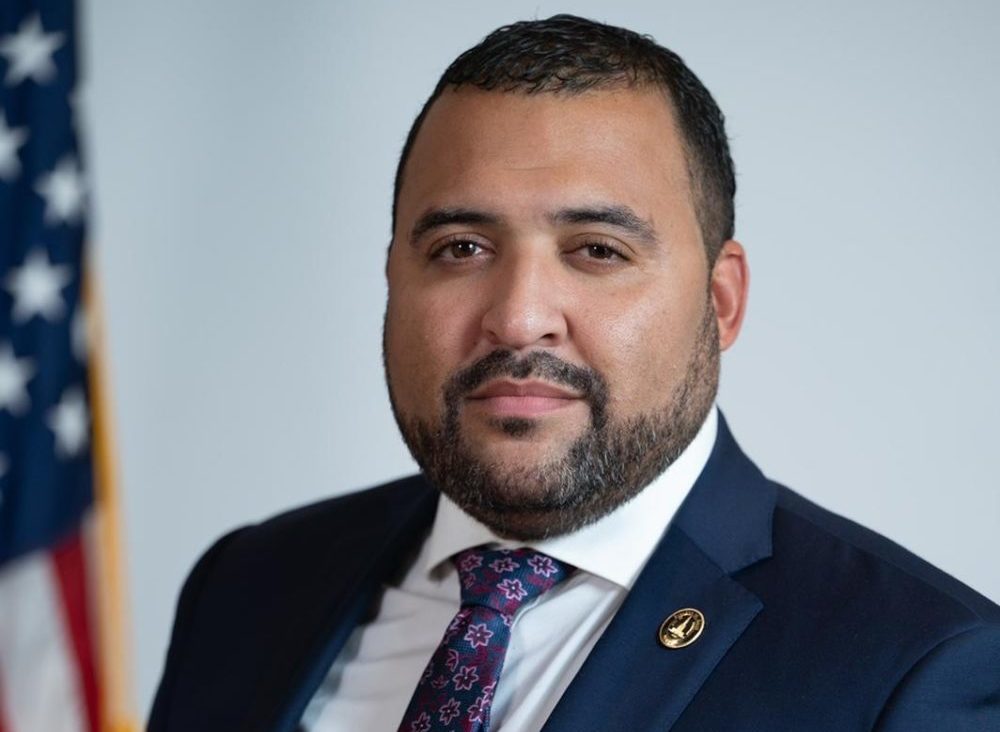To take a title like deputy mayor for community and economic development (DMCED) is to invite public scrutiny and attention, principally because of the association with an office that already endured numerous high-profile departures this year. Those exits included several of Mayor Brandon Scott’s colleagues most connected to the tech and innovation economy, like the former broadband and digital equity director, Jason Hardebeck, and even Ted Carter, the last DMCED.
Justin Williams understood the stakes when he “accepted without hesitation” Scott’s offer of the DMCED position, which he quietly began last month. And they didn’t faze him.
“I’ve completely given up a successful practice and left behind the partnership at my former law firm,” he told Technical.ly via email. “I am in this for the long term because it truly is my dream job.”
Since then, he’s made the rounds of the city’s various sub-economies — including the tech sector, having spoken at last week’s event celebrating Diligent’s first internal academy cohort. For Williams, who rose to the partnership of Rosenberg Martin Greenberg after jobs with the nationwide law firm Venable and Baltimore’s CitiStat team, engaging with the tech sector has been eye-opening.
“Because my legal experience had been primarily in real estate development, and work with small businesses limited to those needing assistance with zoning and/or licensing matters, I did not grasp how fertile the ecosystem was, with 261 funded startups that raised $825 million last year, he said, citing a report from UpSurge Baltimore. “Of course, upon reflection, it makes sense that a robust ecosystem has emerged with our higher education leaders.”
While he continues to learn about it, we caught up with Williams to discuss his tenure so far, equitable economic development, plans to bridge the city’s digital divide and more. This email Q&A has been edited for length and clarity.
***
Technical.ly: Why did you leave private law practice for this position? What led to it?
Justin Williams: I’m only half-joking when I say that ever since I was a kid, watching the TV show “Spin City” and learning that there was a job title called “Deputy Mayor,” I thought it would be an incredible job to have — to be one of the people behind the scenes running a city, ideally with a laugh track. That desire is in part, why I loved my former land use practice area: It was essentially part of my job to keep tabs on state and local political developments, as well as housing and community development policy trends.
What is your view of Baltimore’s tech and entrepreneurship ecosystem? What’s good about it, and what needs to change?
I know the city played a role with ETC Baltimore, but there is potential for the city to be a better partner and intentional about fostering a flourishing ecosystem. Building this out is an important part of the mayor’s vision for equitable economic growth.
One of my first meetings in my role was with UpSurge, which is building an engine to propel Baltimore into the top tier of US innovation cities and making it the country’s first “equitech city.” Our city and region’s diversity is a competitive advantage compared to the other traditional tech hubs, and we can do more to leverage that by supporting founders with capital, networks, talent and expertise.
How will you make tech and innovation a focus of your tenure?
This administration understands how important technology and innovation are to building an inclusive and equitable economic future for our city. We need to prepare residents — particularly those in traditionally neglected communities where we haven’t seen access to well-paying jobs since America’s industrial decline — for careers in growing sectors. We know that business startups account for about 20% of US gross job creation while high-growth businesses account for almost 50% of gross job creation. Local businesses are also far more likely to hire from within our communities. That’s why we’re building partnerships with groups like UpSurge and Techstars to create pipelines for tech startups to build and grow their businesses here in Baltimore, capitalize on our local talent pool, and make our city the first equitech hub in the entire country.

Mayor Scott has pledged to tackle the city’s segregation-fueled digital divide. How will your work address this endemic disconnection that disproportionately impacts Black residents?
He’s tasked me to work with the Baltimore City Office of Information and Technology, who’s taken the lead on the city’s broadband and digital equity efforts, and our other partners to operationalize this commitment. This means working to deliver public WiFi throughout our city, expanding our city-owned fiber network and ensuring that all Baltimoreans have access to internet-capable devices.
Given the various recent departures from the Mayor’s Office, how will you make your tenure stable and productive, and not part of a seeming revolving door?
I am fortunate to have a huge built-in advantage due to previously working for the city, and having been in a position to work for, with and around many civic and community stakeholders in the past decade on development projects. There have already been occasions where an issue arose that required coordination with an agency outside of my portfolio, but I knew the person to contact because we cut our teeth together when I was in CitiStat over ten years ago. There have also been actions on decision memos that I felt confident in making based on my knowledge of the mayor’s priorities — and that it would be overwhelmingly supported by local stakeholders. I could easily see how someone far more talented and diligent than me would need relatively more time to review and analyze the issue before presenting it to the mayor.
My beach reading last summer included the book, “Talent: How to Identify Energizers, Creatives, and Winners Around the World,” written by an economist and a tech entrepreneur/venture capitalist. The book identified a trait that I think is underrated/discussed in business and government: “the ability to perceive, understand, and climb complex hierarchies.” I have had the fortune to be able to build up this trait in my time in the public and private sectors.
I anticipate my tenure being stable and productive because I can focus on the proper goals while having the humility to acknowledge I don’t have all the answers and need to accept input from others.







